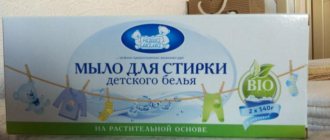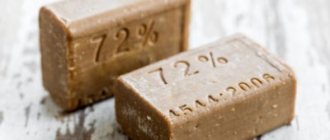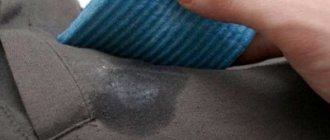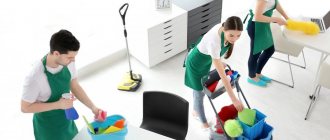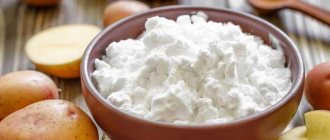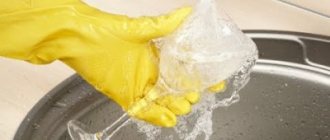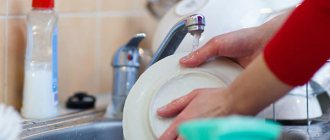Laundry soap is a multifunctional product with a simple composition and low allergenicity.
Due to its good saponifying properties, it can be used not only for laundry or hygiene, but also for washing dishes.
To make cleaning quick and effective, it is necessary to take into account the composition and rules for using soap.
We will tell you further how to properly wash dishes with laundry soap.
Should I use it for washing?
Popular gels and dishwashing liquids contain aggressive surfactants (surfactants). They dissolve well even in cold water and quickly remove dirt, but leave a film on surfaces that is difficult to wash off. Regular use of small doses of surfactants increases the risk of cancer , gastrointestinal disorders, allergies, etc.
Laundry soap does not form a persistent film, so it can be considered a safer dishwashing detergent. The main component of the product is alkaline salts of fats.
When in contact with water, soap decomposes into fatty acid anions and alkali metal cations (sodium or potassium). The hydrophobic part of the anion attaches to particles of dirt and fat, and the hydrophilic part combines with water and transfers the formed complexes into a solution, which is washed off with water. Alkaline cations accelerate the dissolution of fats on the surface of dishes.
What are the dangers of special dishwashing detergents?
Why should you give up effective detergents, a drop of which is enough to wash off grease and dirt from a large number of dishes?
All such products contain surfactants, otherwise known as surfactants . When they get on the dishes, they create an invisible film layer that is very difficult to wash. According to experts, to remove all chemicals from a plate, you should rinse it in clean water at least 15 times.
The surfactant film enters the body. Even after drying, chemicals remain on the dishes and, accordingly, get ingested when food is consumed. They accumulate in the human body and become causes of health problems :
- reduce immunity;
- develop infertility and allergies;
- contribute to the occurrence of gastrointestinal diseases, oncology and problems with the cardiovascular system.
Phosphates, which enhance the effect of surfactants, are also hazardous to health . Their negative impact on the body is so high that a number of countries have banned the production of detergents containing phosphoric acid salts.
The solution is to replace special dishwashing detergents with natural products.:
- choose environmentally friendly products (they are difficult to find in our country, and their prices are high);
- use soda, mustard powder or soap;
- Make your own dish soap.
Composition and properties
The composition and quality of soap are regulated by GOST 30266-2017. According to this standard, it can only contain :
- fatty acid salts,
- water,
- alkali,
- soda and unsaponifiable substances.
To improve technical characteristics, it is allowed to add rosin, kaolin, soap stocks, titanium dioxide, etc.
Soap components and their effect on dishwashing:
| Name | Content | How does it affect |
| Animal, vegetable and synthetic fats (including technical lard) | 64-72% | Provides dissolution of fat and food residues |
| Soda (proportion of free component in the finished product) | Up to 1% | Increases soap effectiveness and promotes foam formation in cold and hard water |
| Alkali (caustic soda) | Up to 0.15-0.20% | Accelerates the dissolution of fats, food residues, soot Soda and alkali are saponifying components |
| Sodium chloride, table salt | Less than 0.1% | Added for technical purposes to separate the soap core during the cooking process |
| Kaolin (clay) | Less than 0.5-1% | Reduces the drying effect of alkali on the skin |
| Rosin | Less than 0.5% | Improves the solubility of soap in cold water, promotes foam formation Slows down the oxidation of fatty acids, increasing the shelf life of the product |
| Soapstocks | Formed during the cleaning process of soap mass, they affect the consistency of the bar | |
| Sodium silicates | Less than 0.1% | Improves cleaning properties in hard water, reduces product stickiness after adding rosin |
| Titanium dioxide, zinc white, hydrogen peroxide | Less than 0.05% | Used for bleaching bars; due to low concentration, they do not affect the properties of soap |
| Natural antioxidant | Less than 0.5% | Necessary for maintaining the properties of soap during the shelf life |
How is the product made?
The production method depends on the product requirements and the starting components . For example, solid bars are produced using sodium alkali, and liquid soap is produced using potassium alkali.
If the product is based not on vegetable or animal fats, but on fatty acids, including those of synthetic origin, then soda ash is used instead of alkali.
The manufacturing process consists of several stages:
- saponification - adding an alkali solution to a fatty base;
- boiling the mixture to a soap glue state;
- cleaning the product from unsaponifiable impurities - salting out;
- final operations (washing, molding, etc.).
Substances that improve foaming can be added in the second or third stage.
How to make laundry soap at home?
To make laundry soap, you first need to get lye.
- 2/3 of the pan is filled with ash from deciduous trees and topped up with water. Infuse for three days and then filter.
- Soap is made from the prepared lye. For 2 liters take 1 kg of fat or oil. All this is boiled for 8 hours, while constantly stirring.
- The result will be liquid soap. If you want it to thicken, you can add a handful of salt.
- This will separate the soap. It needs to be caught and put into shape. After hardening, cut into bars.
Types of detergent
Depending on the content of saponified fats, there are several categories of laundry soap:
- first – 70.5-72%;
- second – 69-70%;
- third – 64-65%.
The category is indicated on the product packaging, and the proportion of fatty acids is indicated on the bar itself. It is recommended to use category 1 soap for washing dishes.
How to choose?
When choosing, you need to pay attention to the following signs:
- The surface is smooth, non-sticky, without cracks, greasy marks, or white deposits.
- Color – from light beige to brown, uniform shade (marble structure is allowed), without foreign solid impurities.
- The smell is specific soapy, without the smell of rancid fat, fish, etc.
- Ingredients : free of fragrances, fragrances and surfactants.
A greenish tint indicates a low content of fatty acids, and a very pungent odor indicates poor cleaning quality of soap stocks.
Many manufacturers produce liquid soap “Laundry”, which is advertised as an identical analogue of solid bars. However, it contains not only saponified fats, but also aggressive surfactants (for example, laureth sulfate).
For the manufacture of household household chemicals, the best solution is soap, which is dominated by unsaturated fatty acids. Due to its soft, ointment-like consistency, the homemade gel quickly becomes homogeneous.
Should I use baby's?
Baby soap contains up to 80% saponified fatty acids , which gives it good cleaning properties. But in addition to natural ingredients, the composition may contain surfactants, synthetic fragrances, dyes and antibacterial substances.
Thus, as a basis for homemade household products, it is better to use high-quality laundry soap made in accordance with GOST.
Criterias of choice
Despite the appearance of dishwashers on sale, not everyone has the means to buy one. And those who are not deprived of finances are sometimes in no hurry to purchase. They justify this step by saying that it is easier to wash one cup and plate than to wait for a whole set to load.
And why spend money on expensive products designed for dishwashers if you can quickly wash everything by hand? How can you remove dirt in this case and is it possible to wash dishes with laundry soap without losing quality?
On the shelves of hardware stores you can find a wide variety of products designed to destroy grease and dirt on kitchen utensils. The variety of prices and products is simply amazing. Sometimes advertising promises that the treasured liquid will cope with the problem in a matter of seconds, without causing harm to health.
The selection criteria for purchasing vary from person to person, but you should still adhere to the following tips:
- The product should quickly deal with fat, but not irritate the skin on your hands.
- Be thick enough and economical.
- The liquid must be completely washed off, without leaving marks or streaks, and be safe.
- Not the least important role is played by the aroma, the appearance of the packaging and the cost.
It is better to choose fragrance-free dishwashing detergents if one of your family members has allergic reactions. In any case, you should feel free to smell a sample before purchasing. If you experience any unpleasant sensations, it is better to choose another product. Of course, it is difficult to find a product completely without preservatives and fragrances, so it is worth carefully studying the composition on the packaging of laundry soap.
If the housewife is a follower of folk remedies, then you can make soap yourself.
Pros and cons of using soap gel
Products based on laundry soap have the following advantages:
are easily washed off from the surface of the dishes without leaving a toxic film;- have a natural composition and do not contain strong allergens;
- have antiseptic properties, suitable for everyday disinfection of household items and surfaces;
- are characterized by economical consumption and low cost;
- Due to the absence of chlorine, they do not harm the environment.
The disadvantages of laundry soap include the following aspects:
- the product dries out the skin greatly;
- in cold and hard water, soap foams worse, rinses off and dissolves fat (for example, whitish stains may remain on glassware);
- complex stains require preliminary soaking in a soap solution and the use of an abrasive.
The absence of aggressive surfactants, dyes and fragrances reduces the risk of allergic reactions, but does not completely eliminate it, so before using the product you need to test on a small area of skin.
Is it possible to wash dishes with laundry soap?
Laundry soap can be used, as it copes well with minor stains without causing harm. Even serious greasy residues on the frying pan can be removed with laundry soap if you first wipe it with a paper napkin.
Experienced housewives recommend adding soda in case of poor cleaning with soap. The best way to do this is to fill a container of water, add soap and soda, then immerse plates and cutlery in the resulting solution. After the procedure, dirt is easily washed off with running water.
Composition of laundry soap
The substances contained in laundry soap do not cause horror among specialists, unlike the composition of dishwashing chemicals. Soap consists of natural vegetable oils, animal fats and alkali. There can be no talk of any harmful elements, phosphates, surfactants, etc. - an extremely acceptable set of components.
Compound soaps do not provoke allergies, do not harm the environment, and they are characterized by antibacterial properties. To clean dishes, it is recommended to purchase yellower laundry soap, since the percentage of fatty acids in it is 64 units. Experts say that the higher this value, the better the cleaning quality of the product. It’s easy to find out the percentage composition of soap - the numbers are pressed right on it, and they mean this value.
How to choose a good laundry soap
Although laundry soap has a not very pleasant smell and dries out the skin, it is still better to choose inexpensive samples for washing dishes. That soap that is devoid of a characteristic aroma, has a pleasant milky tint, already contains chemical elements that make it “beautiful”.
Disadvantages of laundry soap
Laundry soap has not only advantages, but also some disadvantages.
- It contains a small percentage of insoluble substances, so the dishes should also be rinsed well under running water.
- Soap does not foam on its own only if it reacts alkaline. But there is a way out of this situation - you can add soda. In combination, these components work better and create foam, with the help of which dirt is removed even more effectively.
- The problem of dry skin may arise after using laundry soap. But there is a way out, prepare a composition based on soap with glycerin - in this case, you will preserve the natural elasticity of the skin and will not have to return to the use of harmful chemical compositions for washing dishes.
DIY gel recipe
How to prepare dish gel from laundry soap:
- Grind the soap bar using a fine grater. Pour a small amount of hot water into the shavings and place the container in a water bath.
- Wait until the soap is completely melted. Pour in another 500 ml of hot water and stir until smooth. Remove the mixture from the heat.
- Pour 10-15 ml of ethyl/furacilin alcohol or 25-30 ml of vodka into the mixture. This component serves as a natural preservative. To prevent dry skin, it is recommended to add 2-4 tbsp. l. pharmaceutical glycerin.
- Pour the gel into a wide-necked bottle. When it cools, the mass thickens greatly, so a narrow dispenser can make it difficult to squeeze out the gel.
Melting soap shavings over a fire is prohibited, as this can lead to burning of the lower pieces and the appearance of smoke.
To soak dishes and treat heavily soiled surfaces (baking trays, cauldrons, etc.), you should use a thicker paste. When preparing it, instead of 500 ml of water, pour in no more than 200-250 ml.
To remove the characteristic smell of laundry soap, you can add the following components:
- essential oils of lemon, mint, tea tree;
- decoctions of pine needles (instead of clean hot water);
- infusions of cinnamon, cloves and other spices;
- special fragrances for handmade soaps, natural food flavors.
It is not recommended to use lemon juice as a fragrance, since the acid neutralizes the effect of alkaline components.
Dishwashing gel made from laundry soap and soda ash, video recipe:
Traditional methods for washing dishes
Folk remedies are safer than household chemicals for washing dishes
. Folk recipes can be used as a substitute for chemicals for washing dishes. They are time-tested and consist only of natural ingredients.
Choose the recipe that is most convenient for you:
- Mustard . Mix one part dry powder with two parts water and wait a few hours for the mixture to infuse. This composition will do an excellent job of removing congealed grease and clean the surface of the dishes from burnt-on food residues, without causing damage to the delicate coating.
- Soap and glycerin . Combine 0.5 liters of hot boiled water with 1/4 cup of crushed soap and mix until a homogeneous mass with foam is formed. Then, stirring slowly, pour in 2 tbsp. l. glycerin, the same amount of lemon juice and 1 tsp. vodka. For more convenient use, this mixture can be poured into any container after cooling. You can use an old detergent container as a reservoir; the main thing is to rinse it thoroughly.
- Soda. It copes well with carbon deposits on frying pans; you just need to rub the desired area with dry powder using a damp sponge. After dissolving baking soda in water, you can rinse a plastic or glass bottle.
- Fresh pumpkin leaves. Plants will help get rid of oil contaminants on the walls of blood vessels. To do this, you need to knead them a little and use them as a rag. This method will return the dishes to their original appearance and add shine.
- Vinegar and mustard . You need to mix 0.2 liters of vinegar with the same amount of water, add 2 tbsp. l. mustard solution prepared according to the first recipe, 1 tbsp. l. lemon juice and 1 tsp. corn starch. With this mixture, old stains can be easily washed off in a few minutes.
- Vinegar. Can be used in concentrate and as a solution. With its help you can easily get rid of limescale, blackening, and rust. Acid also cleans glassware well, restoring its shine.
- Pine and fir cones. Boil 100 g of cones in 1 liter of water, strain the broth. Mix 1 cup of broth with 2 tbsp. l. soda, salt and crushed soap and bring in a water bath until a homogeneous consistency is formed, stirring constantly. When using 50 ml of this product, mix it with 5 liters of water.
There are many options that will replace harmful chemical cleaning mixtures. You can choose formulations that are made using only natural ingredients or natural products that have a cleansing effect. You can be confident in the composition of your dishwashing detergent only if you prepare it yourself.
Choose the option that you think is most acceptable. The main thing is that the harm is minimal or completely absent. It is this criterion that laundry soap meets in full.
How to use?
When using soap gel, several rules should be followed:
- Before washing, clean the dishes from food residues and rinse with running hot water.
- To soften hard water, add a small amount of soda to it.
- Wash dishes in a large container filled with hot water (basin, sink with a clogged drain, etc.).
- After washing, rinse each item thoroughly under running water.
For washing, it is recommended to use sponges made of foam rubber, microfiber or cellulose.
To improve the cleaning properties of soap, you can add natural abrasives to the gel - coffee, soda or mustard powder. They should not be poured into a bottle, but directly onto the dishes.
Old dirt and carbon deposits can be removed by boiling with soap and soda . To do this, pour water into a frying pan or saucepan with 2-3 tbsp. l. soap gel, boil, add 30-50 g of soda and boil for 30-60 minutes. After cooling, the dirt is washed off with a small amount of laundry soap.
Is it possible to wash children's dishes?
To make high-quality children's dishes, safe silicone and plastic are used, which do not deform and do not release toxins when heated.
Products made from such materials can be soaked and washed in a solution of laundry soap. The use of mustard powder and soda is also allowed.
But it is better to avoid abrasive additives . Solid particles leave microscratches on the material, in which traces of food and pathogenic microorganisms remain.
Homemade pastes and gels are also suitable for washing toys, household items and surfaces. It is recommended to wash thin plastic items that are not designed for high temperatures in warm water with special products containing surfactants of no more than 5-10%.
Healthy Supplements
For greater efficiency, some housewives use little tricks. So, if you need to get a detergent for washing children's dishes, you can add mustard to the solution. It helps to cope with fat better and has an antibacterial effect without harming the child’s health.
To remove stuck pieces of food and carbon deposits, experienced housewives advise adding coffee grounds to the soap. It is worth noting that such a solution has the properties of a liquid with abrasive substances and is not suitable for cleaning Teflon.
To add a pleasant aroma, you can add a few drops of essential oil to the soap.
Rating of the best laundry soap from Test Purchase
“Nevskaya Cosmetics” is the winner of the program
Buyers participating in the qualifying round of the TV show noted that despite the household purpose of the soap, it has a fairly pleasant smell. However, its washing ability did not show a high result: during the experiment, it was not possible to remove stains from berries using Nevskaya Kosmetika.
Since the evaluation of goods carried out in the qualifying round is subjective, all competitors were sent to the independent “Control Purchase” laboratory. Experts measured the proportion of free caustic alkali contained in Nevskaya Cosmetics and also determined the mass of fatty acids. The sample showed the best result among all participants in the selection, for which it received the title of winner of the program.
| Release form | bar soap |
| Fatty acid content, % | 72 |
| Peculiarities | contains glycerin |
| Purpose | universal |
| price, rub. | 53 |
Advantages and disadvantages
- the alkali concentration is not exceeded;
- sufficient fatty acid content.
- low washing ability.

